Renatocalmajr
On this page, you find all documents, package deals, and flashcards offered by seller renatocalmajr.
- 6
- 0
- 0
Community
- Followers
- Following
6 items
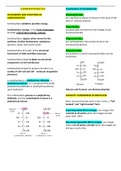
Introduction to Carbohydrate lecture notes
Carbohydrate oxidation provides energy. Carbohydrate storage, in the form of glycogen, provides a short-term energy reserve. Carbohydrates supply carbon atoms for the synthesis of other biochemical substances (proteins, lipids, and nucleic acids) Carbohydrates form part of the structural framework of DNA and RNA molecules. Carbohydrates linked to lipids are structural components of cell membranes. Carbohydrates linked to proteins function in a variety of cell–cell and cell– m...
- Book
- Class notes
- • 9 pages •
Carbohydrate oxidation provides energy. Carbohydrate storage, in the form of glycogen, provides a short-term energy reserve. Carbohydrates supply carbon atoms for the synthesis of other biochemical substances (proteins, lipids, and nucleic acids) Carbohydrates form part of the structural framework of DNA and RNA molecules. Carbohydrates linked to lipids are structural components of cell membranes. Carbohydrates linked to proteins function in a variety of cell–cell and cell– m...
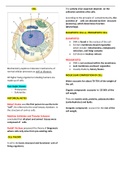
Introduction to cell lecture notes
The activity of an organism depends on the collective activities of its cells. According to the principle of complementarity, the activities of cells are dictated by their structure (anatomy), which determines function (physiology).
- Book
- Class notes
- • 7 pages •
The activity of an organism depends on the collective activities of its cells. According to the principle of complementarity, the activities of cells are dictated by their structure (anatomy), which determines function (physiology).
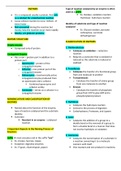
Introduction to enzymes lecture note
ENZYMES • It is a compound usually a protein, that acts as a catalyst for a biochemical reaction • Cause cellular reaction to occur millions of times faster • Not consumed during the reaction but merely help the reaction occur more rapidly • Mostly, are globular proteins
- Book
- Class notes
- • 5 pages •
ENZYMES • It is a compound usually a protein, that acts as a catalyst for a biochemical reaction • Cause cellular reaction to occur millions of times faster • Not consumed during the reaction but merely help the reaction occur more rapidly • Mostly, are globular proteins
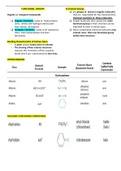
Introduction to functional groups lecture notes
Functional Groups are groups of atoms in organic molecules that are responsible for the characteristics, chemical reactions of those molecules. Simple molecules that contain the same functional group in their structure can be expected to react in similar ways. More complicated chemical molecules may contain more than one functional group within their structure.
- Book
- Class notes
- • 2 pages •
Functional Groups are groups of atoms in organic molecules that are responsible for the characteristics, chemical reactions of those molecules. Simple molecules that contain the same functional group in their structure can be expected to react in similar ways. More complicated chemical molecules may contain more than one functional group within their structure.
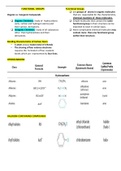
Introduction to functional groups lecture notes
Functional Groups are groups of atoms in organic molecules that are responsible for the characteristics, chemical reactions of those molecules. Simple molecules that contain the same functional group in their structure can be expected to react in similar ways. More complicated chemical molecules may contain more than one functional group within their structure.
- Book
- Class notes
- • 2 pages •
Functional Groups are groups of atoms in organic molecules that are responsible for the characteristics, chemical reactions of those molecules. Simple molecules that contain the same functional group in their structure can be expected to react in similar ways. More complicated chemical molecules may contain more than one functional group within their structure.
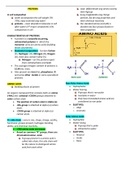
Introductions to Carbohydrates, cell, protein, Enzymes, and Functional groups lecture notes
CARBOHYDRATES OCCURRENCE AND FUNCTIONS OF CARBOHYDRATES Carbohydrate oxidation provides energy. Carbohydrate storage, in the form of glycogen, provides a short-term energy reserve. Carbohydrates supply carbon atoms for the synthesis of other biochemical substances (proteins, lipids, and nucleic acids) Carbohydrates form part of the structural framework of DNA and RNA molecules. Carbohydrates linked to lipids are structural components of cell membranes. Carbohydrates linked to p...
- Book
- Class notes
- • 13 pages •
CARBOHYDRATES OCCURRENCE AND FUNCTIONS OF CARBOHYDRATES Carbohydrate oxidation provides energy. Carbohydrate storage, in the form of glycogen, provides a short-term energy reserve. Carbohydrates supply carbon atoms for the synthesis of other biochemical substances (proteins, lipids, and nucleic acids) Carbohydrates form part of the structural framework of DNA and RNA molecules. Carbohydrates linked to lipids are structural components of cell membranes. Carbohydrates linked to p...
